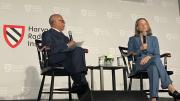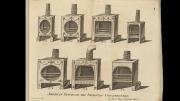Thinking himself near death in 1905, Evelyn Baring, the first Lord Cromer, began a series of "Biographical Notes," written partly that his three sons "should know something of their father's career," partly that they might be of use to a biographer, "if ever my life is written." The shape they give to the first half of his life exercised a powerful influence over the official biography published in 1932. Here is the story of a wild boy who, in spite of being a member of a great British banking family, received very little formal education; of a hedonistic, spendthrift army officer transformed into a sober imperial administrator as a result of the love of a good woman (his first wife, Ethel) and of the example of fellow officers much better educated than he.
Cromer lauds the advantages of being private secretary to a man occupying a high official position, a post, he advises his sons, from which they can "watch the manner in which the most important questions of public life are treated." Indeed, the basis of his own successful career as one of Britain's most dominant proconsuls lay in his apprenticeship to a series of mentors, including a viceroy of India and an international financier, the latter when Baring was the British representative (1877-80) on the Egyptian Commission of Public Debt.
In 1880, when he was just 39, Baring was asked to serve as finance minister to Lord Ripon, the new viceroy of India. Ripon's reform agenda, mandated by British prime minister William Gladstone, included fiscal devolution to members of India's urban elite. Baring wrote to a friend, "I do not think that English statesmen...quite sufficiently recognize that the final cause of British rule in India is to teach the people to govern themselves."
Then came his dispatch to Egypt in 1883 to oversee the immediate evacuation, which he fully approved, of the British troops who had occupied the country the previous year. More than 20 years later, now ennobled as the Earl of Cromer, Baringand the troopswere still there. What caused him to change his mind?
The initial explanation Cromer gave was based on the threat of invasion posed by the Mahdi, a messianic figure whose popular religious revolt threatened to sweep the Egyptian garrisons out of Sudan and spark an Islamic revolt in Egypt itself. Later, there was the difficulty of obtaining great-power agreement to an evacuation contingent on a reoccupation if order broke down once again.
Cromer's account of his stewardship can be found in two great works of imperial justification, Alfred Milner's England in Egypt (1894), which he ghosted if not actually co-wrote, and his own, two-volume, Modern Egypt (1908). The books' audience was the London elite and the growing number of middle- and working-class male electors whose votes could determine British policy. ("Foreign policy," he told Milner, "is predominantly a matter about which the crowd not only should but need to be guided...by drumming the same thing into their heads over and over again.") Here is the story of the rescue of a misgoverned country by a small band of devoted British officials whose reforms brought order, justice, and prosperity not to a nationCromer quickly persuaded himself that Egypt contained no such thingbut to the heterogeneous collection of peasants and pashas, Europeans and Levantines, who constituted what he called the "dwellers of the Nile."
The reality was obviously more complex. And the modern biographer must find a way of analyzing Cromer's part in the Anglo-Egyptian encounter which is true to the historical record and immediately recognizable by those now witnessing a second age of globalization, characterized both by greater interconnectedness and by military interventions and visions of a fundamental divide between East and West.
At one time, a balance-sheet approach seemed enough. That was how many leading Egyptians in Cromer's day summed up his rule, praising him for financial responsibility and economic advance, blaming him for limiting educational opportunities and denying them the right to govern themselves, and taking justifiable offense at his strictures on the backwardness of Islam and the impossibility of its reform. Anti-imperialists made much the same argument.
Cromer's high reputation did not survive World War I. As one reviewer noted, even his official biographer was forced to present him as a "symbol of a vanishing desire imperiously to rule." Writing about Cromer in another age, what appealed to me was a breadth of experience that went far beyond the imperial. The "Biographical Notes" report not just pride in his "work" in Egypt, but also his contribution to many of the still significant global issues of his era: military intelligence, the management of international bankruptcy, media manipulation, and regime change.
A century later, Cromer seems as much a part of modern Egyptian history as any other influential actor, to be assessed in terms of the impact of his policies, for better or worse, on such key trends as the growth of the cotton economy, the solidification of private property, and the supremacy of a landowning elite which dominated the country until swept away by Nasser's revolution in 1952. Whether my Egyptian friends can be persuaded to see things this way is an open question.
Meyer professor of Middle Eastern history Roger Owen is the author of Lord Cromer: Victorian Imperialist, Edwardian Proconsul (Oxford).





